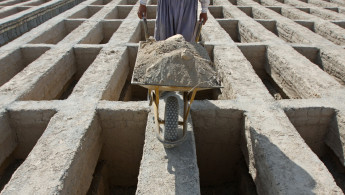Muslim authorities suspend traditional funeral rites to bury coronavirus 'martyrs'
Muslim authorities across the world are adapting traditional religious rites to suit the current coronavirus pandemic.
5 min read
Muslim burial practices have been adapted to suit the coronavirus pandemic [Getty]
As the novel coronavirus claims more lives around the world, Islamic authorities have issued guidance on how to deliver funeral rites for Muslims who have succumb to the devastating Covid-19 illness.
According to Islamic tradition, a deceased person's body must first be ritually washed and then wrapped in a simple white shroud before being buried.
The body is then taken to a mosque, where hundreds may gather to supplicate for the deceased person, before a funeral procession takes place towards the local cemetery.
With the coronavirus crisis seeing millions of homes in lockdown and social distancing being practiced, Muslim authorities have adapted some traditional burial rituals to suit current circumstances.
Scholars and Muslim leaders have been faced with balancing ritual requirements prescribed by the religion with the realities of dealing with an infectious and potentially deadly virus.
Varying opinions
In one video posted by the Malaysian Gazette online news portal, a Muslim volunteer from the Southeast Asian country demonstrates how the procedure is carried out by his team of ad-hoc undertakers.
Rather than washing the body in water, as per normal, he shows how the ritual of tayamum, or dry cleansing, is being adopted by funeral practitioners.
 |
| A video from Malaysia demonstrates a method of washing those who die from COVID-19 [YouTube] |
In the video the man is seen wiping down a model of a body with a white powder made from dry clay. The body must then be re-sealed in a body bag, rather than the usual white shroud.
Other demonstrations show the ritual bathing followed up by a spraying of disinfectant on the casket, when the person has died from Covid-19.
 |
Those who normally perform the ghusl (ritual bathing of the deceased) on the ground, practically, they are scared... |  |
In a video posted to Twitter from the UK, Sheikh Mohammed Aslam - a Damascus-educated imam from the Midlands - said that concerns about transmission of the disease has seen a new fatwa announced that suspends normal funeral rites.
Read also: Three Muslim doctors become first physicians in UK to die of coronavirus
"Those who normally perform the ghusl (bathing) on the ground, practically, they are scared. So after speaking to doctors, consultants and PPE trainers, we have come to this Islamic ruling that the normal ruling of ghusl (washing) and kafan (shrouding) should be suspended," Aslam says in the video.
|
||
The decision takes into account the possibility that UK coronavirus fatalities could reach numbers that would make it impossible for full Muslim funeral rites to be practiced safely, Aslam added.
The Muslim Council of Britain issued a statement saying that the traditional washing of bodies can take place, but the practioner must be aged under-60 and wearing full protective gear when carrying out the rites.
The council, which is an umbrella organisation of over 500 Muslim mosques and institutions in the UK, accepted that there may be differing opinions on the matter and advised British Muslims to consult their local religious leaders.
The guidance followed a statement assuring that the UK government had agreed not to implement enforced cremations of Muslims.
Scaled-down send offs
New restrictions implemented due to the virus pandemic have also forced Islamic burials, which are usually public affairs, to be restricted to a small, private events.
Traditionally, Muslim burials are attended not only by relatives and friends, but often by passers-by and wellwishers who join the funeral procession from the mosque to the place of burial.
This can swell the lines of worshippers who stand closely together to perform the funeral prayer.
|
||
Images from around the world have appeared on social media showing the recent burial of Muslim Covid-19 victims, where only a handful of mourners are present.
One photo purportedly shows mourners clad in full protective gear performing the funeral prayer by a grave side.
In normal cirumstances mourners would stand abreast, but here they are seen standing at a distance from one another.
Religious authorities, meanwhile, have issued fatwas highlighting that funeral prayers can be performed in absentia.
"It is permissible in normal circumstances according to two of the schools of law to perform the funeral prayer in absentia (ṣalat ʿala al-ghā’ib)," reads on opinion from the Fiqh Council of North America.
"Hence in these extenuating circumstances we would encourage this as an alternative for those who are not able to attend the prayer in person of a family member or friend."
Nevertheless, the changes to funeral rites have increased distress and pain for many of the recently bereaved, with some taking to social media to express their feelings.
"You can never be prepared to lose the Corner Stone of your family," wrote one Twitter user.
"And then to lose them when you can't see them, perform janazah, be with the whole family - you are mourning twice. One for the soul, and one for inability to mourn in the way we understand."
Others took comfort in Islamic traditions promising the rank of a martyr to those who die during an epidemic.
"Knowing that they die as shaheeden eases the pain but not being able to have a proper janazah hurts!" wrote one bereaved Twitter user, using the Arabic word for martyrs.
"May Allah grant them the highest of Jannah," they added.
Follow us on Facebook, Twitter and Instagram to stay connected





 Follow the Middle East's top stories in English at The New Arab on Google News
Follow the Middle East's top stories in English at The New Arab on Google News

![22 Arab countries at COP29 have rejected the targeting of fossil fuels [Getty]](/sites/default/files/styles/image_330x185/public/2024-11/GettyImages-2184289638.jpg?h=199d8c1f&itok=ptHl5bec)
![Dozens of people turned out for the funerals [Getty]](/sites/default/files/styles/image_330x185/public/2024-11/GettyImages-2185229760.jpg?h=e7c891e8&itok=1bctDcE6)